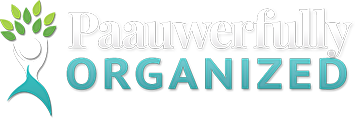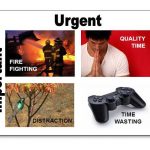Understand the difference between URGENT and IMPORTANT. If it’s important, it may be a vital priority for you. If it’s urgent, it’s time-sensitive, but it may or may not be important.
1. Live your life in the present! Quit saying, “I’ll do this when I get around to it.” Check for balance between work, family, self-care, and community service activities.
2. Increase productivity by planning your week and fine-tuning your workday. Block out time to handle priorities. Check out my free webinar, Managing Priorities, to learn an effective weekly planning process that will keep you focused on what’s most important.
3. Allow unscheduled time in your calendar for the unexpected but important.
[bullet_block style=”size-16″ small_icon=”15.png” width=”725″ alignment=”center”]- Plan your creative activities for a time of day when you are at your best. Not all hours of the day are created equal.
- Plan ahead. If you know that you need to review a report before a meeting, be sure that you have that report on your desk in advance of the time you’ve blocked out to review it.
- Schedule some protected time to work on projects that need your undivided attention.
- Be realistic about your expectations. Don’t set yourself up for failure by planning too much in one day.
- Leave work at a reasonable hour so you can have time to devote to other important areas of your life – self-care, family, and service to others.
4 Reduce your stress. Here are a few tips to help you avoid getting overwhelmed:
[bullet_block style=”size-16″ small_icon=”15.png” width=”725″ alignment=”center”]- NO is a complete sentence. Don’t bite off more than you can chew.
- Delegate as much as you can. Focus on activities that you enjoy and are best at doing, and delegate the rest to others.
- Do it NOW! Sometimes it takes more energy to procrastinate than to simply do it. Of course, not everything should be done now. Use common sense.
5. Set up your work environment to keep your focus on what’s most important.
[bullet_block style=”size-16″ small_icon=”15.png” width=”725″ alignment=”center”]- Arrange your workspace so you have the most commonly-used things close to you. Store things used less frequently in less accessible space.
- Create a filing system that enables you to find things instantly. The #1 reason that people pile instead of file is a fear of not being able to find it when they need it. Click here to attend a free webinar and learn about a system that enables you and others to find anything you file or store in 5 seconds or less.
- Create a tickler file system to remind you of important follow up at the appropriate time. The #2 reason that people pile instead of file is a fear of forgetting to do something. The tickler system will remind you to follow up on the appropriate date. It will also give you a place to store the documentation until you need it. Click here to learn how to get rid of your piles of indecision and avoid paper pile-up forever.
- Use the F.A.T. (File, Act, Toss) method to process your mail daily. When processing incoming mail, decide immediately if it is to be (1) filed for future reference, (2) acted upon, or (3) tossed. If it requires action and you choose not to act on it now, place it in your tickler file for when you will take the next action.
- Keep only what you plan to focus on today on your desktop. Anything you are not working on today can be stored elsewhere until it’s time for you to focus on it.
For more tips, check out these resources:
[bullet_block style=”size-16″ small_icon=”15.png” width=”725″ alignment=”center”]- Free report: 7 Strategies to Overcome Overwhelm
- Free webinars mentioned in this article: click here

Life Architect – Creating Blueprints for Purposeful & Productive Lives
Kathy@OrgCoach.net www.OrgCoach.net Follow me on Facebook





